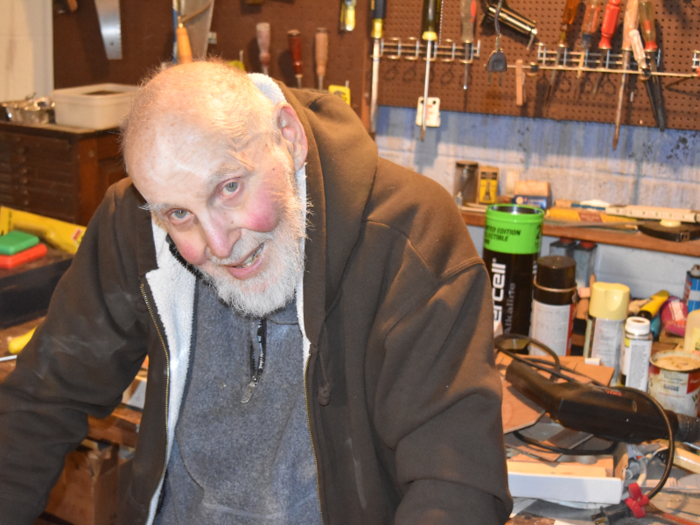- Home
- slideshows
- miscellaneous
- 8 things you can do every day to up your odds of living a long, happy life
8 things you can do every day to up your odds of living a long, happy life
Get moving.

Staying fit can also help keep your brain strong.

In addition to keeping hearts in shape, many studies also suggest that regular movement is a great way to keep our brains sharp and help ward off cognitive decline.
Scientists think the fact that exercisers get more blood pumping to their brains when they work out might have something to do with this benefit.
In addition to cardio, incorporate some lifting into your routine.

Muscle training isn't just about looking good in a tank top.
Studies suggest it can help keep you alive.
A comprehensive review of 23 scientific studies conducted in 2015 suggests that people who develop strong muscles are less likely to die for all kinds of reasons. The finding held true for everyone from cancer patients to people with heart disease, regardless of other factors like how fat or fit they were, how much alcohol they drank, whether they smoked, or how old they were.
"You're never too old to do something," Bryant Johnson, Supreme Court Justice Ruth Bader Ginsburg's trainer, told the Associated Press.
Eat more fresh foods, like vegetables and fruits, which contain health-promoting phytochemicals.

A plate full of colorful plants doesn't just look pretty — those bright colors come from nutrient-rich phytochemicals, which reduce inflammation in the body and help keep people cancer-free.
Vegetables and other plants like whole grains and nuts also help keep people full and satisfied after eating by providing plenty of fiber (which is missing in meat).
Eating more plants may also lead people to cut back on junk food, which we know is linked to more death and cancer cases, and rely less on animal proteins, which are linked to more heart attack deaths.
Specifically, follow the Mediterranean diet, which includes plenty of fresh greens, fish, and fruit.

Study after study suggests that a Mediterranean diet, which is traditionally rich in fish, olive oil, fruits, nuts, and vegetables, is ideal for overall health.
Evidence even suggests that a specific kind of Mediterranean-style diet, called the MIND diet (Mediterranean-DASH Intervention for Neurodegenerative Delay), may be one of the best for avoiding cognitive decline. The MIND diet relies mainly on greens, fresh fruit like berries, and some limited quantities of eggs and cheese.
One 2015 study of over 900 people suggested that people who follow the MIND diet closely can lower their rate of cognitive decline by a measurable amount — the equivalent of gaining 7.5 years of young, sharp life. Another long-term study of the MIND diet involving 600 adults over age 65 is ongoing in the US, with some of the first results expected by 2021.
Enjoy working on tough problems.

One might think that a 96-year-old scientist with a Nobel Prize would be taking it easy now. But not Arthur Ashkin. The physicist — who helped develop optical tweezers, which can pick up tiny objects using only light — still tinkers in his basement lab every day.
People who study age-related decline aren't surprised by that.
"While nobody knows exactly why some people are superagers, we believe that one common factor is that they engage in demanding mental exercise," Lisa Feldman Barrett, a psychology professor who studies superaging, recently wrote in The Guardian.
Finding meaningful work can also help connect us to others — another key to aging well.
"Working for a social cause or purpose with others who share your values and are trusted partners puts you in contact with others and helps develop a greater sense of community," Steve Cole, director of the Social Genomics Core Laboratory at the University of California, Los Angeles, recently told the National Institutes of Health.
Enjoy yourself.

A British which followed more than 9,300 people over the age of 50 over several years, and found that people who generally agreed with statements like "I enjoy the things that I do," "I feel full of energy these days," and "I look back on my life with a sense of happiness," were less likely to die than people who found those statements untrue and said they weren't as happy with their lives.
People who reported some of the lowest levels of enjoyment in life were also the most likely to die.
Pick out friends and companions who you like spending time with, and make them a priority.

One of the best things you can do for your long-term health is to spend time with people who you care about.
An 80-year study of more than 250 men, which started when they were sophomores at Harvard during the Great Depression, suggested that close, nurturing relationships were more important for their long-lasting happiness than wealth, intelligence, or genetics.
"Good relationships don't just protect our bodies; they protect our brains," study director Robert Waldinger said in a TED talk.
Another study of more than 300,000 people around the globe found that people with "adequate social relationships" are 50% less likely to die. Being with a partner can help, too. Researchers have long noticed that married people are better nourished and survive more heart attacks. Married men specifically tend to have better brain health in old age.
Conversely, people who feel more isolated and lonely fare worse when it comes to a host of health outcomes: They develop higher rates of heart problems, obesity, and cognitive decline. In fact, one study of more than 1,600 people in the US over age 60 found that loneliness was predictive of both functional decline and death. (But it's important to remember that loneliness isn't the same thing as being alone, so it's best to focus on the quality of your relationships, instead of how much time you spend around other people.)
Finally, get serious about your sleep schedule.

Sleep makes our waking life possible: When our bodies rest, our brains get to work, flushing out toxins and helping maintain the neural pathways that allow us to learn and form memories.
A lack of good sleep (less than 8 hours a night or so) is linked to higher rates of disease, overweight bodies, stroke, and Alzheimer's.
When we don't get enough snooze time, we deplete our body's stores of white blood cells — natural killer cells that are critical in our immune response.
It's common for older people to sleep less and wake up more frequently. Researchers are still working to identify the mechanisms that regulate sleep in old age, but there are some initial clues that the loss of some of the same receptors in the brain that regulate sleep may also be linked to shorter lifespans.
Popular Right Now
Popular Keywords
Advertisement